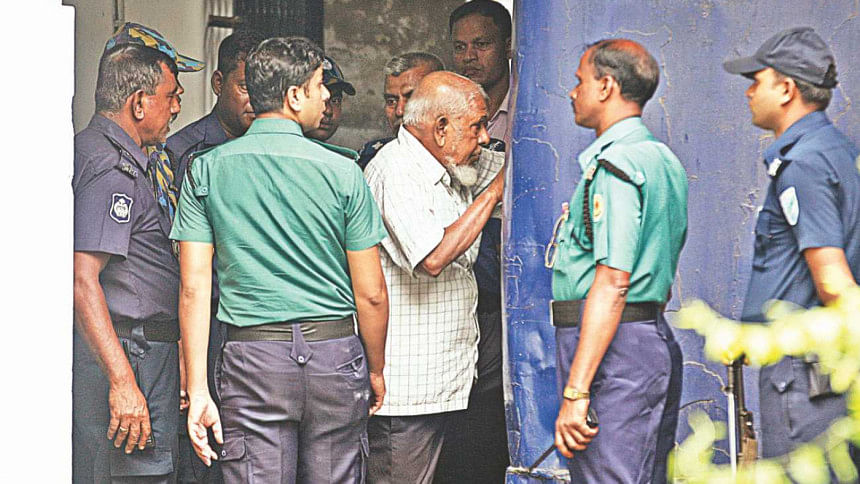3 Al-Badr men of Jamalpur to die

A war crimes tribunal yesterday found guilty eight leaders and activists of anti-liberation Al-Badr force and Peace Committee in Jamalpur and handed down death penalty to three of them and jail until death to the rest.
“The accused persons despite being Bangalee people not only sided with the Pakistani occupation army but remained engaged in committing routine and systematic atrocious activities even by setting up a 'torture cell' occupying the Degree Hostel of Ashek Mahmud College, Jamalpur,” the International Crimes Tribunal-1 said in its verdict.
“Accordingly, the accused persons are held criminally responsible under section 4 (1) of the Act of 1973 for the commission of crimes proved as listed in charge no 2, 3 and 4,” it added.
Ashraf Hossain, 75, Abdul Mannan, 66, and Abdul Bari, 62, all Al-Badr leaders of Jamalpur, were given the capital punishment, while three Al-Badr men -- Prof Sharif Ahammed, 71, Harun, 58, and Abdul Hashem, 60, -- and two Peace Committee leaders -- SM Yousuf Ali, 83, and Shamsul Haque, 75, -- were given jail unto death.
Of the eight convicts, only Yousuf and Shamsul Haque are behind bars and were present at the courtroom as the three-member tribunal led by Justice Anwarul Haque with members Justice Md Shahinur Islam and Justice Md Shohrowardi delivered the 289-page judgement.
The rest have been on the run.
On execution of the three death convicts, the tribunal said they could be executed “by hanging or shooting.” About the fugitives, the tribunal directed the home secretary and the inspector general of police to ensure their arrest, if need be, with the help of Interpol.
Abdul Hannan Khan, coordinator of the tribunal's investigation agency, told The Daily Star yesterday that Ashraf had been living in India for many years and got married there. He said they do not know about his whereabouts.
“We think the other fugitives are still in Bangladesh,” he added.
After the verdict, Tureen Afroz, conducting prosecutor of the case, told reporters, “We are happy for the hundred percent conviction of the accused.”
Laila Mostari, a retired professor and daughter-in-law of victim Abdul Hamid Muktar, has meanwhile said, “We are satisfied with the verdict.”
“Those who have been sentenced to death are still absconding. They should be immediately captured by the government and executed,” she told our Jamalpur Correspondent.
Rawshan Ara Mallik, wife of another victim Nurul Amin Mallik, also expressed satisfaction over the verdict and thanked the government for holding the trial of Al-Badr men who committed atrocities in Jamalpur in 1971.
The people of Jamalpur have also expressed satisfaction over the verdict.
Gazi MH Tamim, defence counsel for Yousuf and Shamsul, said they would challenge the verdict in the Appellate Division and expressed the hope the apex court would acquit his clients.
According to the International Crimes (Tribunals) Act, 1973, a war crimes convict can file an appeal with the SC within 30 days from the date of the verdict's pronouncement.
CONVICTS' ROLE, CHARGES AND PUNISHMENT
Al-Badr Bahini, an auxiliary force of the Pakistani army, first came to existence in Jamalpur and Sherpur after the war had broken out, according to the prosecution.
Ashraf along with executed war criminal Muhammad Kamaruzzaman, and Kamran, all leaders of Jamaat-e-Islami's the then student wing Islami Chhatra Sangha, organised Al-Badr in greater Mymensingh.
Ashraf was the chief of the Al-Badr torture camp and Mannan, Bari, Harun and Hashem, the workers of Chhatra Sangha, were also the Al-Badr men having close and constant affiliation with the said camp which was in fact a 'torture cell', the prosecution said.
“In 1971, accused Md Ashraf Hossain became the incarnation of the angel of death [Azrail] in Jamalpur,” the tribunal observed.
Sharif Ahammed alias Sharif Hossain used to keep him in close contact of the Al-Badr force and the Al-Badr torture camp, it mentioned. After the Liberation War, Sharif worked with the Islami Bank Bangladesh, according to the case document.
Yousuf Ali, who was made president of Jamalpur Peace Committee, had close association with the Pakistani army, Al-Badr camp and criminal activities carried out there, while Shamsul, who was also engaged with Peace Committee, collaborated with the Pakistani occupation army, according to the prosecution.
The tribunal handed down death penalty to Ashraf, Mannan and Bari for leading an Al-Badr group in the killing of three unarmed civilians in between July 7 and July 22, while Sharif and Harun were given jail until death for their involvement in the crimes.
“Of those five accused persons, Md Ashraf Hossain, Md Abdul Mannan and Md Abdul Bari were in a leading position of Jamalpur Al-Badr Bahini. It already stands proved. Their position of authority and level of dominance must come forward as an aggravating factor which may be considered in awarding sentence upon them,” the tribunal observed.
All the eight but Harun were given jail until death for their involvement in the abduction and murder of Awami League leader Nurul Amin, also an organiser of the Liberation War, on July 10, 1971.
The special court gave jail until death to Ashraf, Sharif, Mannan and Bari for their culpability with the confinement, torture, murder and other inhuman acts committed in a torture cell at Ashek Mahmud College's Degree Hostel between April 22 and December 11.
The sentences of imprisonment will run concurrently and other sentences will be merged with the execution of death penalty, the tribunal said.
The court, however, said the prosecution failed to prove the first and fifth charge, which was also related to abduction, torture, confinement and murder in Jamalpur during the nine-month-long war.
With the latest verdict, two war crimes tribunal have so far delivered 25 judgements. Forty-two people were convicted, including 27 sentenced to death, of the crimes they committed during the Liberation War.

 For all latest news, follow The Daily Star's Google News channel.
For all latest news, follow The Daily Star's Google News channel. 


Comments